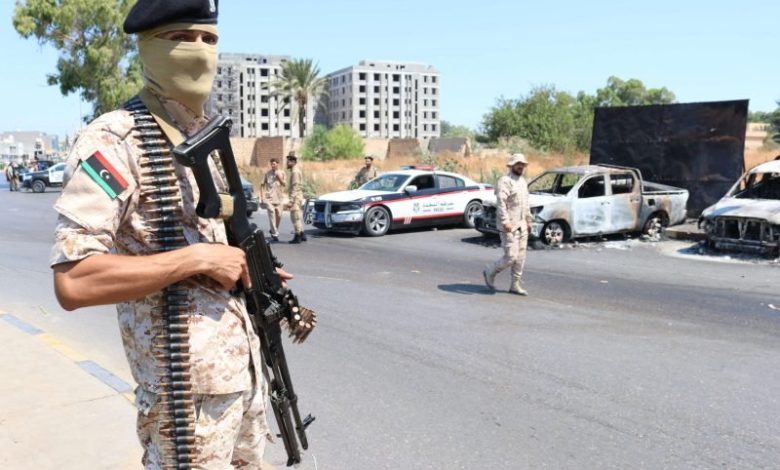Violent Clashes Between Major Factions Threaten Stability in the Libyan Capital

Intense clashes have erupted in the Libyan capital, Tripoli, between the Deterrence Force affiliated with the Government of National Unity and the 444th Brigade under the Presidential Council. This highlights that militias, armed groups, and mercenaries remain the biggest challenge to the peace efforts.
Fierce clashes broke out in Tripoli on Monday evening and continued into Tuesday, leading to the suspension of flights to the main city airport and the suspension of classes at Tripoli University. Reports indicated that a senior commander of one armed faction was apprehended by a rival faction, suggesting that militias, armed groups, and mercenaries remain a significant obstacle to the UN and regional efforts to establish peace, unify Libyan state institutions, and hold elections.
Rogue militias have become a major dilemma for the residents of the capital and western Libya. Limiting their influence remains a significant challenge for the country. Rogue armed groups and clashes between armed factions led to protests in the city of Zuwara in western Libya a few months ago.
A resident of the Farnaj neighborhood stated, “We heard gunfire for about two hours, and we don’t know what will happen. We fear for our safety.” Meanwhile, local media and a source within the 444th Brigade reported that the Deterrence Force for Combating Organized Crime and Terrorism detained Mahmoud Hamza, the commander of the 444th Brigade, which controls a significant part of Tripoli around Mitiga Airport. This incident reflects the ongoing power struggle and settling of scores.
Osama Ali, a spokesperson for the Emergency and Ambulance Authority, stated on Tuesday that the armed confrontations between the two security forces in Tripoli that erupted on Monday are still ongoing. He called for a ceasefire to evacuate families.
He added that the Emergency and Ambulance Authority “received several calls today from families trapped in conflict zones, but reaching them is still difficult.” He also mentioned that “26 families were evacuated from conflict areas on Monday.” He called for “relying on reason.”
He indicated that “so far, there has been no response from the warring armed groups.” He noted that one of the ambulance vehicles “was hit by a gunshot without the driver or accompanying crew being injured.”
The Deterrence Force follows the Government of National Unity led by Abdul Hamid Dbeibeh, while the 444th Brigade follows the Presidential Council led by Mohammed el-Menfi. This recent clash comes a few months after clashes between the Deterrence Force led by Abdulraouf Kara and the 111th Brigade led by Abdel Salam Al-Zoubi over a dispute related to a maintenance contract for Tripoli International Airport.
Sources at the airport stated that all flights to and from the airport have been redirected to Misrata, located 180 kilometers to the east.
Meanwhile, Tripoli University announced the suspension of classes, exams, and administrative work on Monday until the situation stabilizes in the capital.
The university issued a brief statement on its Facebook page: “The Presidency of Tripoli University informs you of the suspension of classes, exams, and administrative work for tomorrow, Tuesday.”
If the fighting continues between these two factions, which are the largest armed groups in the capital, it poses significant risks and threatens to drag the entire western region of Libya back into violence.
Monday’s clashes are already the worst the capital has seen in months, despite sporadic violence between armed factions in other parts of northwest Libya in recent weeks.
Such developments underscore the importance of calls made by UN envoy Abdullah Belheeg and regional and international powers to address the issue of militias, rogue armed groups, and foreign forces in order to end the division in Libya.
Since the 2011 uprising supported by NATO, Libya has not experienced a significant level of peace or security. The country split in 2014 between eastern and western warring factions. While major fighting has stopped since the 2020 ceasefire, there is no sign of a permanent political resolution.
A video posted online shows what a witness to the clashes confirmed as an authentic scene: a projectile passing in front of a residential building amid the sound of gunfire.
Journalists and eyewitnesses in the Ain Zara suburb near the clashes reported that armed individuals have closed a main road in the area.












